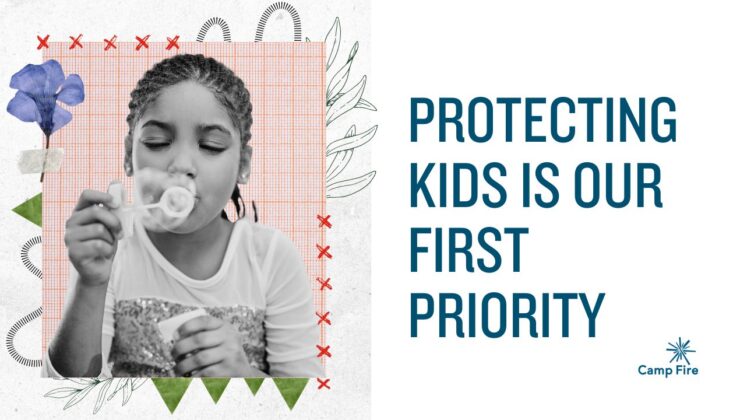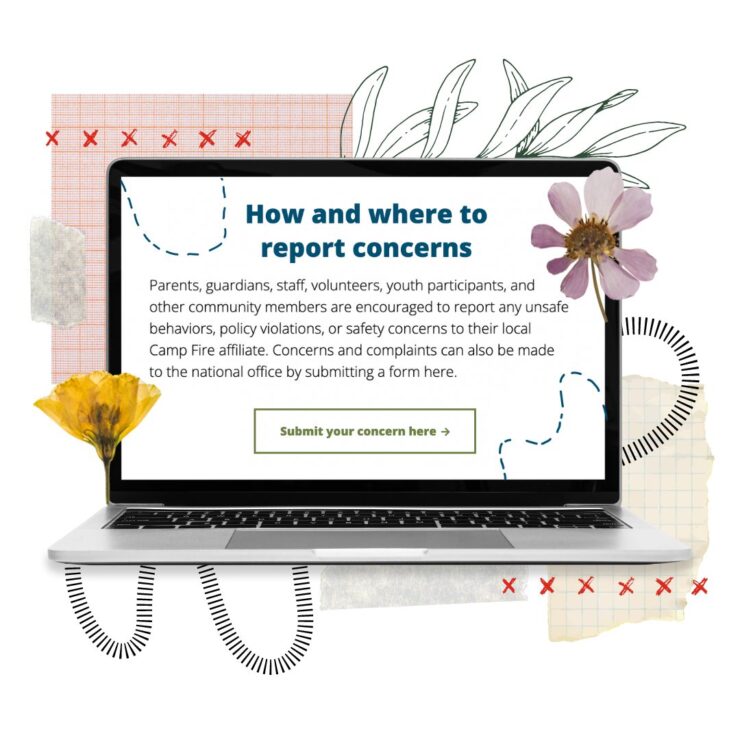Protecting Kids Is Our First Priority
Protecting kids is our first priority
 Safety is at the very heart of what Camp Fire is all about. In fact, you could say it’s the very first thing we do. If kids aren’t safe, nothing else matters. We have to first support child wellbeing and safety overall before we can achieve our mission of connecting young people to the outdoors, to others, and to themselves. That’s why all of our programs are built on a core foundation of child safety. How do we do that?
Safety is at the very heart of what Camp Fire is all about. In fact, you could say it’s the very first thing we do. If kids aren’t safe, nothing else matters. We have to first support child wellbeing and safety overall before we can achieve our mission of connecting young people to the outdoors, to others, and to themselves. That’s why all of our programs are built on a core foundation of child safety. How do we do that?

Our new Child Safety and Protection page outlines the basics: Both national headquarters and all councils, including Camp Fire Central Oregon, have zero tolerance for adults who engage in abusive behaviors or attempt abuse. We conduct background checks, require mandatory reporting, work with the best experts to review our practices and make us stronger, constantly train our staff and volunteers, have a streamlined and serious incident reporting protocol, and adhere to National Youth Protection Standards.
 One of the newest updates we’ve made is to include an anonymous reporting button on our Child Safety page. Nikki Roe Cropp, Program Effectiveness Director and certified Praesidium Guardian, explained that any reports submitted through the online, anonymous method go directly to her and fall under the mandatory reporting rules. In other words, the report will be taken seriously and action will be taken within 24 hours.
One of the newest updates we’ve made is to include an anonymous reporting button on our Child Safety page. Nikki Roe Cropp, Program Effectiveness Director and certified Praesidium Guardian, explained that any reports submitted through the online, anonymous method go directly to her and fall under the mandatory reporting rules. In other words, the report will be taken seriously and action will be taken within 24 hours.
“While we want folks to go to their local affiliate first and address concerns at the council level, it’s important to have that anonymous reporting mechanism in place,” said Nikki. “It helps create a culture of safety when everyone knows there’s another level they can go to for reporting any concerns.”
The new page also features a collection of resource videos for parents, guardians and other community members from our partner in preventing abuse Praesidium. Learn how to talk to children about abuse prevention in age-appropriate ways, the warning signs of abuse, and more.
“It takes everyone to prevent abuse,” Nikki said. “By giving parents, guardians and caregivers information on how to recognize interactions that may be inappropriate or put their kids at risk, organizations can enlist them as informal members of their risk management team.”
 In addition to these new online resources, Camp Fire has been adding to its already extensive suite of training resources for staff and volunteers. Nikki said that they’ve added a second training module for program supervisors as a follow up to “Part 1: Responding to Abuse and Abuse Risk”. Part 2 is all about monitoring and supervising staff, young people and program spaces.
In addition to these new online resources, Camp Fire has been adding to its already extensive suite of training resources for staff and volunteers. Nikki said that they’ve added a second training module for program supervisors as a follow up to “Part 1: Responding to Abuse and Abuse Risk”. Part 2 is all about monitoring and supervising staff, young people and program spaces.
“One thing people might not think about is the structural and facility elements that go into preventing abuse,” said Nikki. “Where is abuse likely to occur? What spaces are unsupervised and isolated? We want supervisors to proactively think about their space and how to go about monitoring it. This prevents access to kids and limits the amount of privacy and control potential offenders have.”
Having a systematic plan to make sure all participants and places are monitored not only helps prevent child abuse perpetrated by adults, but also reduces peer-to-peer abuse and bullying. (Nikki recommended Johns Hopkins’ Desk Guide as a particularly good resource on preparing staff and volunteers to address youth sexual behavior in developmentally appropriate ways.)
 Camp Fire has also added refresher courses for seasonal employees, training for Camp Fire board members on their unique role in prevention, and an updated Counselor in Training toolkit that helps teens think through how they can set good boundaries and prevent youth-to-youth abuse.
Camp Fire has also added refresher courses for seasonal employees, training for Camp Fire board members on their unique role in prevention, and an updated Counselor in Training toolkit that helps teens think through how they can set good boundaries and prevent youth-to-youth abuse.
“We want to make sure our employees and volunteers are continuing to have these conversations about child safety,” Nikki said. “We want to have regular touch points, so they can come back to the main content, reiterate and lift it up during the entire year.”
Nikki will be bringing even more training to Camp Fire’s network as a recently certified Stewards of Children® facilitator through Darkness to Light. This training program helps participants learn to “prevent, recognize and react responsibly to child sexual abuse.”
The program has been proven to work: Participants are five times more likely to say they know how to help prevent abuse, four times more likely to ask organizations about their sexual abuse prevention policies, and three times more likely to look for abuse warning signs.
As we look forward to summer, what can we all do to make sure kids are safe at camp? We can ask questions and demand the right practices and policies are in place to protect young people and prevent abuse. Nikki recommends checking out these resources for parents:
- Darkness to Light’s Summer Camp Safety Checklist: A list of questions to ask and conversations to have before camp begins, including only choosing camps that have a policy in place that limits the opportunity for one-on-one situations.
- Praesidium’s 6 Key Questions a Parent Should Ask of a Camp: Important protection questions to ask before signing up for a camp program, including how the camp ensures consistent supervision.
 Don’t shy away from asking your Camp Fire council and camps the hard questions! We trained for this — and we’ll continue to.
Don’t shy away from asking your Camp Fire council and camps the hard questions! We trained for this — and we’ll continue to.
“We are going to continue to rise to the challenge and put the best possible prevention policies in place across the Camp Fire network,” said Nikki.
